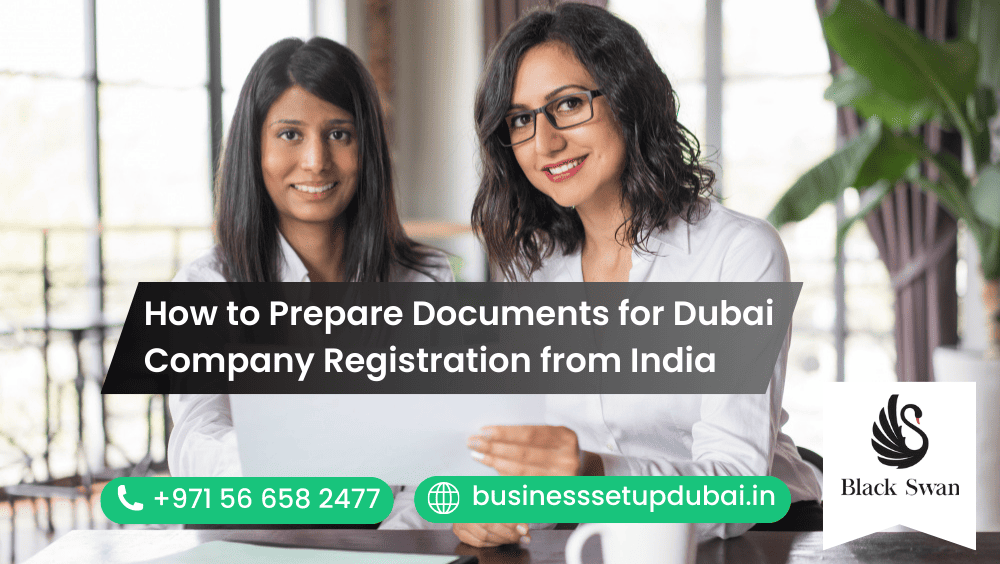Renewing a Dubai business license can feel “run-of-the-mill” right up until something impedes it – an expired Ejari, a past-due payment, a missing compliance certificate or a free zone portal that refuses to accept your upload. So, rather than thinking of trade license renewal as a task that we do at the last minute, it’s actually much smarter to consider it as a short process that we repeat with clear points in between.
You will learn how business license renewal in Dubai happens for Dubai mainland and free zones, the essential documents, what may hinder approval and ways to prevent late fees from piling up. You’ll also receive a handy checklist and FAQs you can give to your admin team.
1) What “license renewal” means in Dubai (and who controls it)
A business license in Dubai is issued by the relevant authority depending on your jurisdiction:
- For mainland companies the normal renewal process is through the Dubai Department of Economy and Tourism (DET) licensing authority.
- Freezone companies are renewed directly with their own free zone authority (eg Dubai Development Authority for some zones, JAFZA for Jebel Ali Free Zone, DMCC for all DMCC companies).
While the gateways and fees vary, renewal logic remains much the same: maintain a (license) active, confirm premises/lease, check compliance your activity and clear dues before expiry. Get details on Business License Amendment Services in Dubai.
2) Why renewing on time matters (beyond “avoiding fines”)
Most owners know an expired license is “bad,” but the knock-on effects are what truly hurt:
- You may face service restrictions (banking, government transactions, permits).
- You can’t reliably renew or issue visas if your company file is not in good standing (varies by authority).
- Your contracts and invoicing can become messy if clients request updated license copies.
- Delays can be more expensive than renewal — as they eat up staff time and invite penalties
Mainland renewals Generally mainland registrations mention a grace period if the registration expires, although it is not something you should ever depend upon. One frequently cited benchmark is 30 days for mainland renewal grace — missing that can lead to fines and restrictions.
3) Mainland vs Free Zone renewals: the key differences
Dubai mainland license renewal
In many cases, a mainland trade license renewal is straightforward if your lease is valid and you have no compliance flags. Many renewals run through online service channels offered by Dubai’s business set-up/renewal ecosystem.
Common dependency: a valid Ejari / tenancy contract that matches your company file.
Free zone license renewal
Free zones follow their own renewal checklists. For example:
- Dubai Development Authority emphasises renewing annually and maintaining a valid license.
- JAFZA lists specific renewal documents (and in some cases an Operational Fitness Certificate depending on setup).
- DMCC publishes detailed late-renewal penalty slabs for expired licenses.
Common dependency: clearance of dues (license fee, facility fee, any penalties) and updated company documents.
4) Best time to start: a practical timeline
To keep things calm, don’t start on the expiry week. Instead, use this working rhythm:
- 60–90 days before expiry: review lease validity, update contact details, check compliance needs (industry approvals, office inspections, etc.).
- 30–45 days before expiry: prepare documents and settle dues.
- 14 days before expiry: submit the renewal and pay promptly.
- After renewal: download and circulate the renewed license copy to bank/clients/internal teams.
This “start early” approach aligns with many professional renewal guides, and it reduces surprises like an Ejari mismatch or missing certificates.
5) Documents commonly needed for trade license renewal in Dubai
Exact requirements vary by activity and authority, but these are the usual items businesses prepare:
Core documents (very common)
- Copy of current/expired trade license
- Shareholder/manager passport copies
- Emirates ID copies (where applicable)
- Valid Ejari / tenancy contract or lease confirmation
- Any prior renewal receipt(s), if requested by the authority
These document types appear consistently across renewal guidance for Dubai and free zone set-ups.
Compliance documents (depends on your activity)
You may also need:
- External approvals (regulated activities)
- Compliance certificates (building or facility requirements in some zones)
- Any free zone-specific forms or declarations
For example, JAFZA’s guidance highlights additional requirements and, in certain cases, an Operational Fitness Certificate. Obtaining an Professional License in Dubai.
6) Step-by-step process: how license renewal usually works
Even though portals differ, the renewal flow is usually:
Step 1: Confirm your license data and expiry
Start by pulling your license number, company file details, and expiry date. Then, verify that the activity list still matches what you actually do.
Step 2: Validate your premises/lease
This step causes the most delays. Ensure your Ejari (or free zone lease) is active, correctly typed, and linked to the company.
Step 3: Clear dues and penalties
Before you renew, settle:
- license renewal charges
- facility/office fees (free zones)
- any outstanding penalties
Step 4: Submit the renewal request (online)
For a large majority of renewals, the process can be started online via the responsible service portal (examples guide those through login > renewal > entry of license number > upload documents).
Step 5: Pay and receive the renewed license
Once you’re signed off, you’ll be able to pay and download your renewed license copy. Save it in a shared admin folder and mail it to the stakeholders. Get details on Business License Amendment Services in Dubai
7) Late renewal penalties: what to expect
Penalty rules vary by authority. Mainland penalties and enforcement can differ from free zones. However, free zones may publish clear penalty tables.
For example, DMCC has published revised late renewal penalty FAQs showing penalty tiers based on how many days the license is expired (including 0–30 days: AED 0 under revised penalty fees, and increasing fees for later ranges).
So, the safe rule is simple: renew before expiry, because penalty regimes are not uniform across Dubai.
Related Articles:
» How to Obtain a Business License in Dubai?
» How to Obtain a Trade License in Dubai?
» Understanding Business License in Dubai: Types and Requirements
» Professional License Activities in Dubai
» Starting a Logistics Business in Dubai: Licenses and Requirements
8) Renewal checklist (copy/paste for your admin team)
Area
What to check
Why it matters
License details
Correct activity list, correct trade name, expiry date
Prevents renewal rejections and future amendments
Lease / Ejari
Active Ejari or valid free zone lease
Common cause of renewal blocks
IDs & documents
Passport/Emirates ID copies, license copy
Standard upload set
Compliance
External approvals/certificates if regulated
Some activities can’t renew without approvals
Payments
Clear renewal fees, facility fees, penalties
Most systems won’t issue the renewed license until paid
After renewal
Save renewed license, notify bank/clients
Keeps operations smooth
9) Common renewal delays (and how to avoid them)
Here are the issues we see most often—and how to fix them quickly:
- Expired or mismatched Ejari/lease → Renew/align the lease first, then re-attempt renewal.
- Wrong or outdated shareholder documents → Use clear scans; ensure passports are valid.
- Uncleared penalties → Pay fines early to avoid portal blocks.
- Regulated approvals not renewed → Start external approval renewals well before license expiry.
- Incorrect activity scope → If you changed business activities, update/amend before renewal.

10) When to use a business setup / PRO service for renewal
If your renewal is clean, you can often renew directly. However, it’s worth using a PRO/business setup team when:
- you have multiple branches or multiple licenses
- you’re switching office space and need Ejari aligned
- you have regulated activities with external approvals
- you’re already late and want to minimise penalties and downtime
In other words, use support when the cost of a delay is higher than the service fee.
FAQs on “Understanding the Process of Business Licensing Renewal in Dubai”
In almost all day to day usage, people are referring from the same thing: re-issuance of your company’s legal operating license by issuing authority (mainland or free zone).
Mainland licensing services sit under Dubai’s Department of Economy and Tourism (DET) ecosystem, and renewal services are available through official service channels.
No. Each free zone sets its own document checklist, fee structure, and penalties.
For many mainland cases, a valid Ejari (or tenancy contract confirmation) is a common requirement and often blocks renewal if expired or mismatched.
Ideally 30–90 days before expiry, so you can fix lease and compliance issues without panic.
The most frequently quoted professional references allow a 30-day grace period for mainland renewal, but with potential penalties and restrictions depending on your case you need to renew before the expiry date.
DMCC publishes penalty slabs based on the number of days your license is expired, with revised fees increasing after 30 days and other consequences beyond longer delays.
Typically: current license copy, shareholder/manager IDs, and lease/Ejari evidence—plus any compliance approvals depending on your activity.
In many cases, yes—authorities provide online renewal pathways, and guides describe login + “Renew License” steps through the relevant portal.
Often, yes. If your license expires, you may lose access to a range of Government services and your visa processing facilities may also be affected (varies by authority).
Usually, activity changes are treated as amendments, not “simple renewal.” Handle amendments first, then renew.
Start early, confirm Ejari/lease validity, clear dues, and prepare clean document scans in one folder before you submit.
















